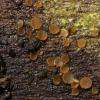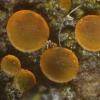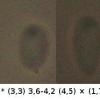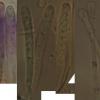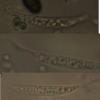
16-01-2026 00:45
Ethan CrensonHi all, On decorticated hardwood from a New York

18-01-2026 12:24
Hello.An anamorph located on the surface of a thin

17-01-2026 19:35
Arnold BüschlenHallo, ich suche zu Cosmospora aurantiicola Lite

08-12-2025 17:37
 Lothar Krieglsteiner
Lothar Krieglsteiner
20.6.25, on branch of Abies infected and thickened

10-01-2026 20:00
Tom SchrierHi all,We found picnidia on Protoparmeliopsis mur

13-01-2026 07:28
 Danny Newman
Danny Newman
Chlorociboria glauca on indet. decorticate logThe

15-01-2026 15:55
 Lothar Krieglsteiner
Lothar Krieglsteiner
this one is especially interesting for me because
Orbilia tremulae?
Viktorie Halasu,
10-04-2020 20:15
 Hello,
Hello,I've found this Orbilia on wet decorticated wood (probably Salix), on the ground.
Only a little refractive exudate on paraphyses top + scattered on cells near margin.
Uppermost spore mostly with SB up, but not always (3rd ascus from left is with SB down).
I'm not sure if the anamorph belongs to it.
Given the habitat and spore size, could it be Orbilia tremulae? Isn't it too much orange?
Thank you in advance.
Viktorie
Hans-Otto Baral,
10-04-2020 21:55

Re : Orbilia tremulae?
Hi Viktorie
Could be, but sure we cannot be. These fusiform spores might be ascospores?
The Dicranidion conidia of O. tremulae would be characteristic.
O. tremulae is probably a common species, but I am often not sure, and our concept is only tentative. With DNA it would be easy - or with a culture or conidia from near apothecia.
Zotto
Lothar Krieglsteiner,
11-04-2020 09:54

Re : Orbilia tremulae?
... das hätte ich (früher) als coccinella bestimmt. Aber vermutlich ist dies eine Sammelart geworden, wie so vieles.
LG von Lothar
LG von Lothar
Hans-Otto Baral,
11-04-2020 10:03

Re : Orbilia tremulae?
Ja, das ist kompliziert geworden. O. coccinella ha hörnchenförmige Sporen in 16-sporigen Asci. O. tremulae hat eigentlich als NFF das japanische Dicranidion inaequale, aber das passt nur morphologisch. Neben der häufigen O. eucalypti gibt es noch ein paar weitere mit ellipsoiden bis subglobosen Sporen.


